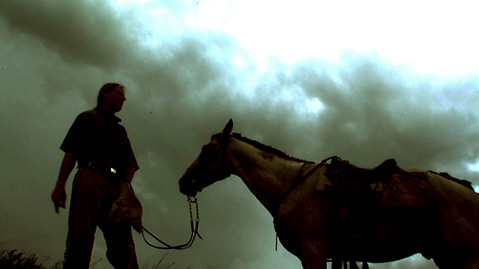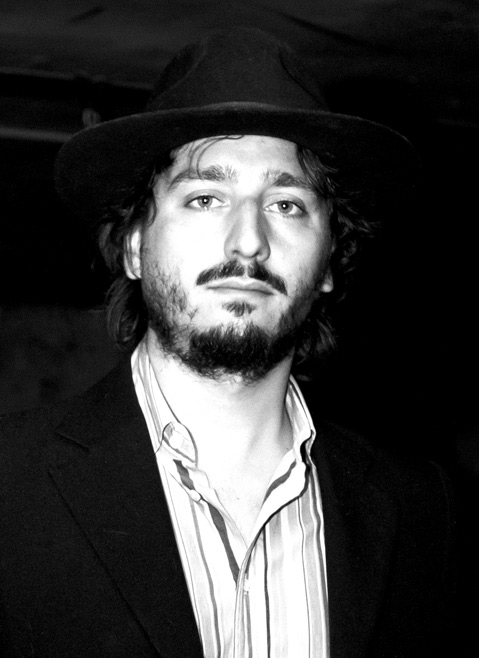Land
An Interview with Julian Pinder

After buying what he thinks is a piece of paradise, Canadian citizen Julian Pinder finds himself amidst the resort-developing rush of southwestern Nicaragua. He gets behind the camera to find out who’s good, who’s bad, and how nationalistic politics affects it all in this compelling look at the developing Central American world.
Pinder, who will be in attendance for his screenings on February 3 and 4, recently answered a few questions about the film.
What year did you buy the land?
Fresh out of fleeing film school, I bought a beautiful little piece of farmland in southern Nicaragua in the early 2000s for about the price of a used, poorly maintained Ford Taurus. The reason I loved Nicaragua in the beginning is because it was so real. There wasn’t a whole lot of noticeable outside influences, the people were proud. It was a country with an inimitably complicated and dynamic history, from dictatorships to filibuster invasions, and literature, poetry, art, then revolution. I felt strangely at home in Nicaragua much more than I feel at home in Toronto.
How quickly did you realize that the development rush was on?
The next bizarre chapter in Nicaragua is what Land follows: the development explosion. It happened at an alarming rate, and much of it was speculation. One foreigner would buy land from a local family, then flip it to another foreigner, who would cut it up into lots, or plots, then re-sell it to another foreigner, and this would go on and on and on. So that piece of land worth $5,000, suddenly, was going for $150,000 two years later. Everyone in town was talking about real estate, about finding more property. Agents swarmed the coast, entire planes full of potential investors were flown down, frenzied. It got a bit unsightly. And you can imagine how much tension there was when some of the locals who initially sold their family land for a pittance were seeing that same land re-sold, just a year or two later, for an enormous amount of money. When I saw this development frenzy begin, I thought, shit, here’s a film.
Did you have any idea how much national politics would affect everything?
Back in Canada we elect the right, then the left, and things typically remain unchanged with the exception of shifts in funding and social programs. But in a country like Nicaragua, the second poorest in the northern hemisphere, the government of the day is everything. For North America or Europe, aid, multilateralism, and trade, are all contingent on the relationship with that party in power. So, yes, I was well aware of the influence of national politics in Nicaragua, or at least the influence of the perception of national politics.

When Danny Ortega became President again, the real estate boom really ran for cover. And much of the fear was, admittedly, the assumptions of what Ortega might do. But, as you see in Land, his ascent to power gave many of the Nicaraguan who were being exploited, the courage and confidence to fight back, as it were.
Is there a happy medium for places like this that need economic development but don’t want to be overdone?
This typically becomes a heated debate. I don’t pretend to be a political analyst or development expert. What I do is make films from human stories. As such, I can comment on what I have seen with the individuals and community that I followed throughout Land. I for one am strongly opposed to homogeneity and the exporting, or importing, of dominant cultures. And more because I think it’s a shame to see the interesting and absurd aspects of the world slowly disappearing than any actual political stance on the matter. Despite whether one agrees or not, I’m always for challenging audiences and stirring up some emotions, even if those are directed toward me, in whatever form they may take on. There’s a controversial documentary out called Enjoy Poverty, and I think it’s an interesting partner to Land.
Some groups or individuals — oddly enough foreigners, no Nicaraguans as of yet — have lambasted me for criticizing development. They’ve flung the rhetoric of jobs, economic boost, etc., at the argument. But it’s rare to discuss what types of jobs are being created, where the spoils of these markets are going, and the sustainability of new, often transitory economies. And we have to be honest with ourselves. Here we are in the so-called “developed world” enjoying our comforts — and I’m as guilty as the next here — but the framework we’ve created is the very system that’s allegedly got us hovering on the edge of extinction, if I may be so bold. There really is no right or wrong, in my mind, just a whole lot of gray area that needs careful consideration, and dialogue, and not just in the under-developed world. That’s why Land focuses more on the individuals involved, and their microcosmic struggles within these arguments, while leaving the final judgment, if they so desire it, to the audience.
What’s the status now? Do you still own your land? Are the other projects still in limbo?
As far as I know I do still own the piece of land. I haven’t seen it in a few years now. During the shooting of much of Land, I unfortunately didn’t have the time or energy to take care of it. To be honest, as far as I know it could easily be in the hands of someone else. I’m trying to figure out whether to keep it and build a little something, maybe do something for the community. I’m not sure yet. I’m open to ideas.
Many of the developments in Nicaragua have shut down. Of course there are still some moving forward. Fred Goldfarb, one of the individuals in Land, is still developing, and I hear he’s doing some interesting work with sustainable concepts. Sean, another individual in the film, is also rumored to be back in Nicaragua attempting to develop, despite everything. I have a great respect for these two individuals as sort of Fitzcarraldo characters pushing on against all odds. But the other developers have long since fled the country, some more willingly than others, as you’ll see in the film.
4•1•1
Julian Pinder’s Land is scheduled to screen on Monday, January 31, 8:05 a.m., at the Metro 4, and on Thursday, February 3, 4 p.m., and Friday, February 4, 7 p.m., at the Santa Barbara Museum of Art. Pinder will attend the last two screenings. The schedule is subject to change, so see independent.com/sbiff for updates.



